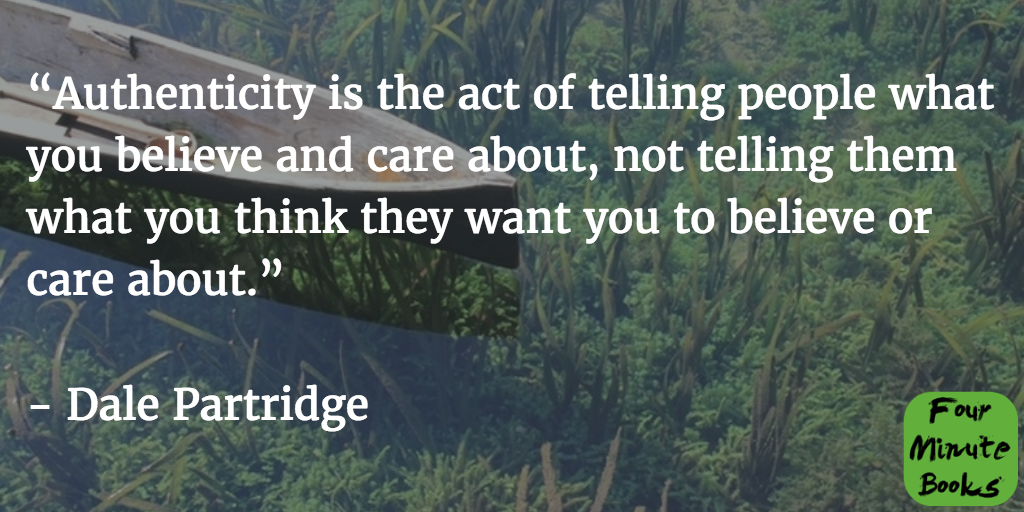1-Sentence-Summary: People Over Profit evaluates the four stages most companies go through as they mature, moving from honest over efficiency to deception and, if they’re lucky, redemption, unless they foster seven core beliefs and stay honest all the way to the end.
Read in: 3 minutes
Favorite quote from the author:

Audio Summary
Listen to the audio of this summary with a free reading.fm account*:
There’s always someone incredibly famous that you don’t know yet. Today, that was Dale Partridge for me. He runs Sevenly, a very cool for-profit charity company, which designs clothing and products for a different charity each week, with $7 for each purchase going to the chosen charity, before the cycle starts over.
His book, People Over Profit, explains the four stages of honesty and deception and how companies can avoid ending up in the latter stages in the first place.
Here are 3 lessons about what makes honest companies honest (and how you can help build more of them, even without creating your own):
- Every company starts as an honest one.
- Good companies embrace transparency, instead of trying to avoid it.
- By making better choices as a consumer, you can do your part in an honest business world.
Let’s learn more about one of my favorite character values together, shall we? It’s honesty hour!
Lesson 1: All companies start out honest.
First of all, if you think some companies are inherently bad, Dale argues that that’s not true. Even Coca Cola, McDonalds and Goldman Sachs started out with very few people, and had to hustle hard to make ends meet in the beginning.
No company can afford to scam its first 1,000 customers or treat the first 10 employees like crap.
Dishonesty isn’t an attitude or company-inherent value from the start, it slowly grows over time, but only if corporations are forced into it.
When McDonald’s started, their motto was “Quality, Service, Cleanliness and Value”. Yup, those burgers weren’t always stale! Quality was just the first factor that fell off their roadmap as the company got bigger and bigger and had to serve more burgers faster.
So remember: Even the worst companies were once small, honest businesses.
Lesson 2: Don’t try to avoid transparency, it’s a fool’s game.
One of the seven values Dale describes that can help your business stay honest is transparency. We constantly talk about privacy and data security these days (in Germany people go crazy over this), but actually, you can double-check almost any statement within a matter of seconds.
People find dirt in leaders’ Twitter feeds, dig up old company reports and records and record their experiences on video more and more.
If your company sells shitty meat, it’s bound to come out somehow, some time. Even if you run the biggest hush-up campaign, transparency always wins. Great companies know this.
That’s why they embrace transparency right from the beginning. They’re an open book, fully transparent, all numbers for the world to see. Buffer is a great example.
What does your company or employer do? Can you encourage them to be more transparent?
Lesson 3: Become a better consumer, because half the responsibility is on you.
Here’s the interesting part: Even if you don’t own a company, half of the honesty battle is yours to fight.
Why?
Because we as consumers vote with every dollar we spend. It’s easy to point the finger at Coca Cola for trying to sell more Coke to Indian kids, who don’t even have shoes, and then buy a 24-pack for $5 the next week when it’s on sale.
If you want more sustainable products, demand more sustainable products. Check where your products come from, pay attention to the packaging and please, if something about a product stinks, tell the company.
Imagine all of those $50,000 every American family spends on average each year went to honest companies. None of them would have to resort to deceitful tactics. The power is in your hand. So use it well.
We’ll all be better for it.
People Over Profit Review
Most business books focus on tactics. Some focus on strategies. Few address philosophy. This is one of the few. In Germany there’s a saying: it’s the head where the fish reeks. If you can foster a spirit of honesty among your first few employees and keep this philosophy alive until your company is all grown up, you’ll automatically teach it from the top down for a long time to come.
Sure, it’s possible to redeem your company, should you end up in the dishonesty stage, but does it even have to get that far? Dale thinks it doesn’t, and neither do I, which is why I suggest you pick up People Over Profit 🙂
Who would I recommend the People Over Profit summary to?
The 33 year old, who’s head is spinning from all the awesome blogging and online marketing tactics she reads about, but that might lead her down the wrong path, the 68 year old former CEO, who realizes he can still go back to companies and teach them about honesty, even if it’s not a model that was lived when he was still active, and anyone who says they want better products, but still shops based on price.
Last Updated on August 1, 2022